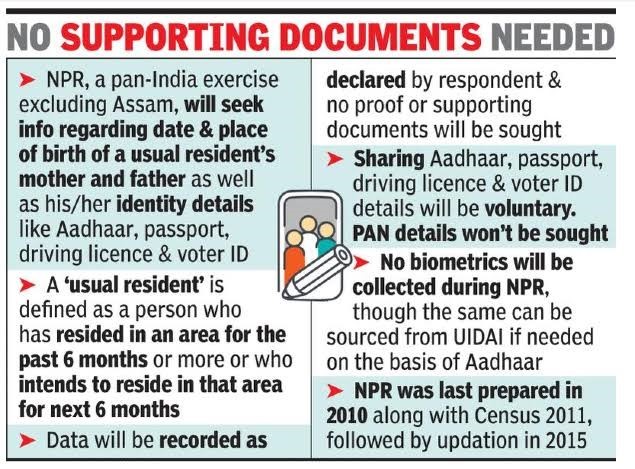[ad_1]
GS Paper 3
Topics Covered: Internal security related issues.
Context:
The latest form of the National Population Register (NPR) appears to have retained contentious questions such as “mother tongue, place of birth of father and mother and last place of residence”, according to a document compiled by a committee under the Registrar General of India.
What’s the issue?
Though NPR was first compiled in 2010 and updated in 2015, the new questions were part of a trial exercise involving 30 lakh respondents in September 2019.
The exercise has been opposed by some States and citizen groups as NPR is the first step toward compilation of the National Register of Indian Citizens (NRC) according to Citizenship Rules, 2003.
How is NPR different from Census?
The objective of the NPR is to create a comprehensive identity database of every usual resident in the country and it is “mandatory for every usual resident of India to register in the NPR.”
While similar data is collected through Census, according to Section 15 of the Census Act, 1948, all individual level information collected in Census is confidential and “only aggregated data are released at various administrative levels.”
Criticisms surrounding NPR:
Many Opposition-ruled States have opposed the updation of the NPR due to its link with the proposed National Register of Citizens (NRC) and the yet to be implemented Citizenship Amendment Act (CAA).
- According to Citizenship Rules framed in the year 2003, NPR is the first step towards compilation of National Register of Indian Citizens (NRIC) or NRC.
What is NPR?
The NPR is a register of usual residents linked with location particulars down to the village level and is updated periodically “to incorporate the changes due to birth, death and migration”.
- The next phase was to be simultaneously updated with the 2021 House Listing and Housing Census but has been indefinitely postponed due to the COVID-19 pandemic.
Who is a usual resident?
A usual resident is defined for the purposes of NPR as a person who has resided in a local area for the past 6 months or more or a person who intends to reside in that area for the next 6 months or more.
Insta Curious:
- Did you know that the process of updating NPR will be carried out under the aegis of the Registrar General and ex-Officio Census Commissioner, India? Know all about NPR here,
- Are you aware of the security features of ‘Aadhaar PVC Card’? Read Here
InstaLinks:
Prelims Link:
- Constitutional provisions related to Citizenship.
- Components of NPR data.
- Who is an usual resident?
- Who prepares NPR?
- How can a person acquire Indian citizenship?
- Can an Indian citizen hold dual citizenship?
- What are long term visas?
- Latest amendments to the Citizenship Act.
Mains Link:
Why are states opposed to the collection of data under NPR. Discuss.
Sources: the Hindu.
[ad_2]


